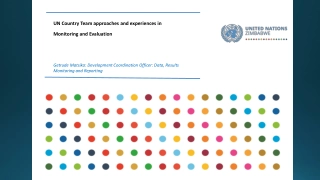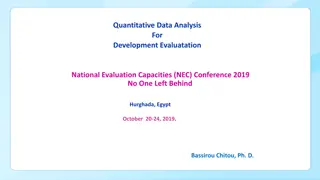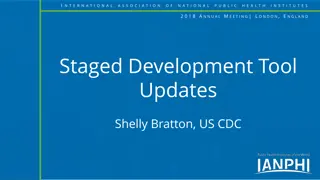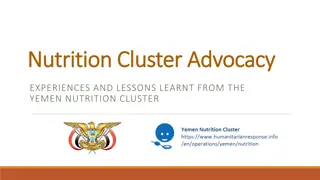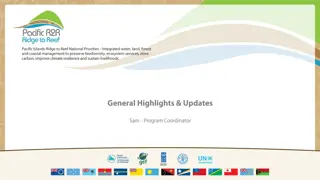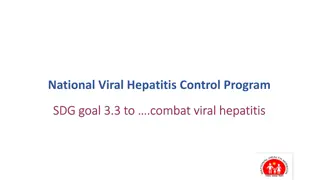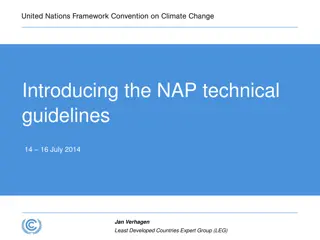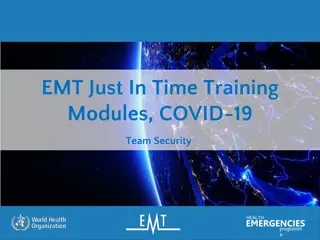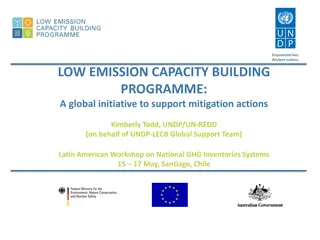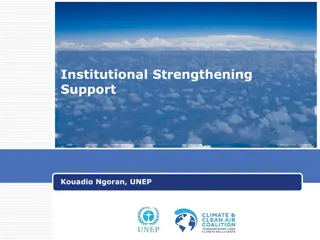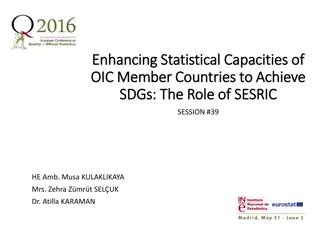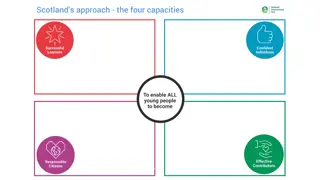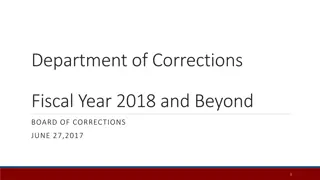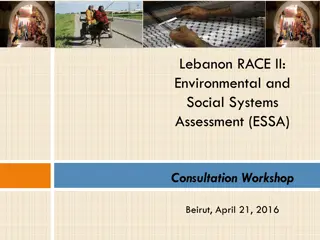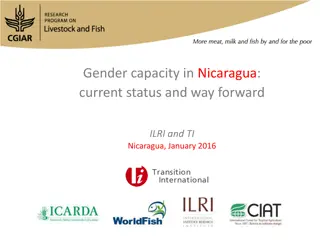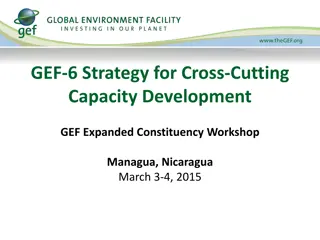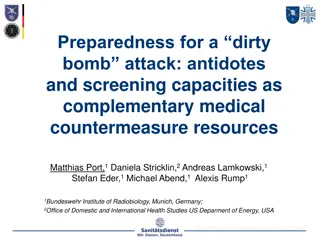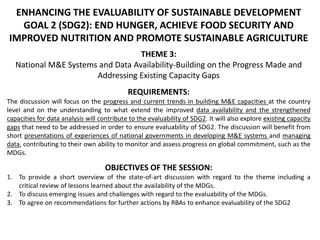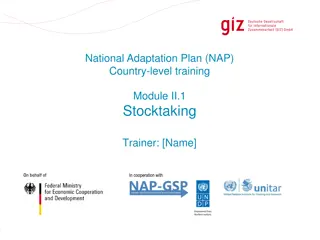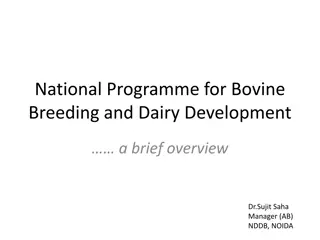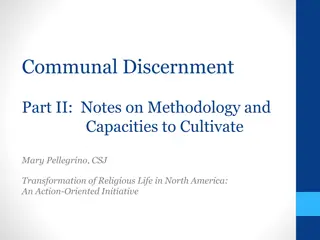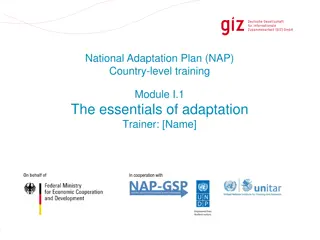UN Country Team Approaches in Monitoring and Evaluation in Zimbabwe
The UN Country Team in Zimbabwe is focused on supporting the government in delivering transformative change for all citizens. They aim to strengthen institutional capacities and empower communities to drive human development and productivity, ultimately leading to a better quality of life for all. T
1 views • 30 slides
National Digital Platform for Agriculture Extension
The Ministry of Agriculture & Farmers Welfare, along with Digital Green, is developing a national digital platform to enhance the extension system in agriculture. This platform aims to strengthen the digital capacities of extension workers and improve access to verified agricultural knowledge for fa
1 views • 8 slides
IAEA Quality Assurance Assistance in the Caribbean - V. Tsapaki, IAEA Medical Physicist
Serving as the global focal point for nuclear cooperation, the International Atomic Energy Agency (IAEA) supports Member States in utilizing nuclear science and technology for sustainable development. The Technical Cooperation Programme aims at building capacities for safe nuclear technology use. Co
3 views • 18 slides
Understanding How to Read a Load Chart for a 100-ton Crane
Load charts are essential for determining safe lifting capacities of cranes in construction and heavy machinery operations. This guide explains how to interpret load charts based on factors like boom length, operating radius, and load weight, ensuring safe and efficient crane operations. Learn to id
5 views • 7 slides
Strengthening National Evaluation Capacity in the Era of Sustainable Development Goals
The presentation by Vijayalakshmi Vadivelu at the National Evaluation Capacities Conference 2017 in Istanbul focused on the importance of strengthening national evaluation capacity in alignment with the Sustainable Development Goals (SDGs). The content covers the holistic approach to national evalua
3 views • 18 slides
Fort Logan National Cemetery - Historical Overview and Future Expansion Plans
Fort Logan National Cemetery, located in Denver, Colorado, has a rich history dating back to its establishment in 1889. Originally a post cemetery, it was designated as a national cemetery in 1950. The cemetery has steadily expanded and currently ranks 11th out of 155 national cemeteries in terms of
2 views • 7 slides
“Quantitative Data Analysis for Development - NEC Conference 2019 Overview”
Explore the key modules of the National Evaluation Capacities Conference 2019 focusing on quantitative data analysis for development. Covering topics such as basic concepts, summary statistics, bivariate analysis, hypothesis testing, data visualization, and the effective use of dummy tables in evalu
0 views • 25 slides
Compliance Report on Madibeng Local Municipality by Ms. M. Rosho
Presentation to the Portfolio Committee on Cooperative Governance and Traditional Affairs detailing compliance matters, budget management, financial health, and support received by Madibeng Local Municipality from Provincial Treasury. The report highlights challenges in adopting funded budgets, fina
0 views • 26 slides
Understanding National Income Measurement in India
National income in India is the culmination of all economic activities valued in money terms. It plays a crucial role in determining the economic environment of a country and the demand for goods and services. Various measures of national income such as Gross National Product (GNP), Gross Domestic P
0 views • 20 slides
Institutional Support for Entrepreneurial Development - Overview and Objectives
Accelerating small industries' development is crucial, and governments have established institutions like District Industries Centers (DIC) to provide various support services under one roof. DIC functions include entrepreneur identification, project selection, asset purchase, and more. Additional a
5 views • 12 slides
Staged Development Tool for National Public Health Institutes
The Staged Development Tool (SDT) is a facilitated self-assessment process designed to assist National Public Health Institutes (NPHIs) in assessing capacities, identifying gaps, and developing actionable plans. It supports planning and prioritization in NPHIs across various countries, including Gui
0 views • 5 slides
Hydrographic Capacity Building Strategies for Sustainable Development
Capacity building in hydrography involves assessing and supporting sustainable development of States to meet international maritime objectives. It is a process that goes beyond training and aims to enhance safety at sea, protect the environment, and boost national economic growth. The strategy is ex
8 views • 25 slides
Advocacy Strategy Development for Nutrition Cluster in Yemen
Amidst the challenges in Yemen, the Nutrition Cluster advocacy efforts focused on developing a comprehensive strategy to address nutritional needs of the affected population. The process involved partner identification, stakeholder engagement, strategy development, and implementation planning. The a
1 views • 9 slides
Regional Integrated Coastal Management and Island Water Resources Resilience Program
The program focuses on strengthening national and local capacities for integrated coastal management and island water resources resilience, incorporating climate change adaptation. It involves investments in human capital, mainstreaming approaches into development planning, establishing regional and
0 views • 8 slides
National Viral Hepatitis Control Program - Achieving Universal Health Coverage and Elimination Goals
The National Viral Hepatitis Control Program in India is working towards combating viral hepatitis and achieving SDG goal 3.3 through a comprehensive approach that includes awareness generation, prevention, management, and financing under the NHM. The aim is to eliminate hepatitis C by 2030, reduce
0 views • 19 slides
NAP Technical Guidelines Overview
The NAP Technical Guidelines offer a structured approach for countries to navigate the National Adaptation Plan process, focusing on key elements such as groundwork, gap analysis, implementation strategies, and monitoring. These guidelines provide activities, steps, and questions to guide the formul
0 views • 17 slides
Understanding National Debt and its Implications
National debt refers to the total money owed by the government to financial institutions and individuals. Managing national debt, measured through the Debt/GDP ratio, is crucial as it impacts future taxpayers and national wealth. Borrowed money comes with the burden of interest repayment, posing cha
0 views • 49 slides
Protective Capacities for In-Home Safety Assessment
This session focuses on understanding and enhancing protective capacities within families to ensure in-home safety. Topics covered include defining protective capacities, exploring different categories and levels, and examining how safety threats operate. Participants will learn practical strategies
0 views • 9 slides
EMT Just-In-Time Training Modules for Health Emergencies: COVID-19 Team Security Program
This program focuses on preparing EMT personnel for surge roles during health emergencies, specifically in COVID-affected communities. It outlines duty of care policies, security concerns reporting channels, security plan components, staff exposure reduction techniques, and crowd management principl
0 views • 29 slides
Trends in Internet Governance and National Sovereignization in Russia
The discussion revolves around the trend of aligning cyberspace with national borders, emphasizing national security concerns in the context of internet governance in Russia. It covers topics such as reframing cybersecurity as a national security issue, militarization of cyberspace, territorializati
0 views • 11 slides
Load Following by Nuclear Power Plants in Relation to Variable Renewable Energies' Development
The study explores the requirements of load following by nuclear power plants in the context of variable renewable energies' growth. It discusses the impact of renewable energy development on nuclear economic models and the need for dispatchable capacities. Benchmarks are set to test robustness of d
0 views • 11 slides
Global Low Emission Capacity Building Programme Overview
The Low Emission Capacity Building Programme is a global initiative by UNDP aimed at enhancing capacities for designing and implementing Low Emission Development Strategies and national mitigation actions in various sectors. It includes components like GHG inventory management, NAMAs, LEDS, MRV, and
0 views • 12 slides
Supporting National Planning for Action on SLCPs - SNAP Initiative Overview
The Supporting National Planning for Action on SLCPs (SNAP) Initiative aims to develop capacity in partner countries for effective national action planning on Short-Lived Climate Pollutants (SLCPs). Key objectives include supporting national SLCP planning processes, enhancing tools for emission scen
0 views • 12 slides
Enhancing Statistical Capacities of OIC Member Countries to Achieve SDGs: The Role of SESRIC
This presentation discusses the importance of enhancing statistical capacities in OIC member countries to achieve Sustainable Development Goals (SDGs), with a focus on the role of SESRIC. It covers the evolution of statistical definitions, the use of Statistical Capacity Index (SCI) for analysis, an
2 views • 17 slides
Poverty Statistics in Mongolia: Current Trends and Challenges
Official statistics on poverty in Mongolia from the National Statistics Office covering methodology, trends, multidimensional aspects, and challenges faced in data collection and monitoring. The data highlights the need for cooperation, funding, and improved statistical capacities to address poverty
0 views • 11 slides
Scotland's Four Capacities Approach in School Community Ethos
Scotland's education system emphasizes developing four key capacities in students, including self-respect, resilience, critical thinking, and more. The approach aims to foster holistic growth by enabling learners to excel in various areas, communicate effectively, make informed decisions, and engage
0 views • 4 slides
Analysis of Correctional Facilities and Inmate Populations in Fiscal Year 2018 and Beyond
The data presented includes information on incarceration rates, reduction of inmates in Oklahoma, operational impact of meeting comparison rates, capacity analysis of different facility types, and comparisons based on rated operating capacities. Key points include significant reductions in inmate nu
0 views • 58 slides
Ford-Fulkerson Algorithm for Maximum Flow in Networks
The Ford-Fulkerson algorithm is used to find the maximum flow in a network by iteratively pushing flow along paths and updating residual capacities until no more augmenting paths are found. This algorithm is crucial for solving flow network problems, such as finding min-cuts and max-flow. By modelin
0 views • 26 slides
Lebanon RACE II Program for Education Improvement
The Lebanon RACE II program aims to enhance access, quality, and overall effectiveness of education systems for children and youth. Through pillars focusing on access, quality, and system strengthening, the program addresses various aspects such as improving educational services, learning environmen
0 views • 39 slides
Pan American Health Organization / World Health Organization Multilateral IHR NFP Strengthening Workshop Toolkit
This toolkit serves as a guide for strengthening International Health Regulations National Focal Points, focusing on aligning procedures, promoting cooperation, enhancing communication, and developing collaborative activities. It includes objectives, mission activities, findings, recommendations, mi
0 views • 8 slides
Gender Capacity in Nicaragua: Current Status and Future Prospects
The report discusses an objective gender capacity assessment in Nicaragua, focusing on analyzing current gender capacities and designing tailored interventions for sustainable development. It highlights tools used, partners assessed, and the context in Nicaragua and other countries. Challenges in ge
0 views • 19 slides
Capacity Development Strategies and Examples in Environmental Management
Capacity development (CD) is the enhancement of individuals, organizations, and societies to tackle environmental issues and integrate environmental sustainability into policies. The Global Environment Facility (GEF) focuses on National Capacity Self-Assessments (NCSAs) and critical projects to buil
0 views • 10 slides
Antidotes and Screening Capacities for Dirty Bomb Attack Preparedness
Explore the preparedness strategies for dealing with the aftermath of a dirty bomb attack, focusing on antidotes, screening capacities, and medical countermeasures. Learn about the types of injuries, national stockpiles for radiological and nuclear emergencies, and different approaches to decorporat
0 views • 14 slides
Enhancing Evaluvability of Sustainable Development Goal 2: End Hunger and Achieve Food Security
This session explores building M&E capacities at the country level to enhance evaluability of SDG2. Discussions focus on progress, data availability, capacity gaps, and recommendations for action. Presentations share experiences from national governments on developing M&E systems. Malaysia's experie
0 views • 12 slides
KVCR.FM/TV/FNX Service and Sustainability Enhancement Plan
Boosting revenues, securing ongoing funding, and optimizing organizational structure are key priorities for KVCR.FM/TV/FNX. The goals include increasing revenue, community engagement, production capacities, and growing FNX into a major national network. Administrative actions focus on optimizing exp
0 views • 28 slides
National Adaptation Plan (NAP) Stocktaking Training Overview
This training module provides insights into the importance of stocktaking in the National Adaptation Plan (NAP) process. Participants will learn about different stocktaking methods, utilizing stocktaking results for NAP development, and identifying gaps and needs. The session covers subjects like po
0 views • 14 slides
National Programme for Bovine Breeding and Dairy Development Overview
The National Programme for Bovine Breeding and Dairy Development (NPBBDD) is a Government of India funded project aimed at enhancing bovine breeding and dairy development in the country. It consists of two components: National Plan for Bovine Breeding (NPBB) and National Plan for Dairy Development (
0 views • 30 slides
Enhancing Communal Discernment: Methodology & Capacities
A detailed exploration of communal discernment in religious communities, focusing on methodology and capacities for cultivating discernment skills. It emphasizes active engagement in discerning God's desires, shared work, prayerful community, learning, and the ability to hold tension and ambiguity.
0 views • 18 slides
Essential Training on National Adaptation Planning
This training module focuses on enhancing understanding and capacities for National Adaptation Planning (NAP) processes. It covers the basics of climate change, adaptation concepts, challenges, and the importance of adaptation for development. Through interactive sessions and case studies, participa
0 views • 16 slides
Role of the CFREU in National Asylum and Immigration Law: Perspectives from Dr. Martina Flamini
Dr. Martina Flamini, a Judge from the Court of Milan, discusses the effects of the Charter of Fundamental Rights of the European Union (CFREU) at the national level in asylum and immigration cases. The presentation explores the application of the CFREU in national laws, the role of national judges i
0 views • 38 slides
